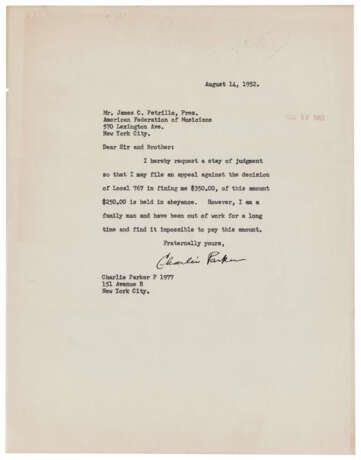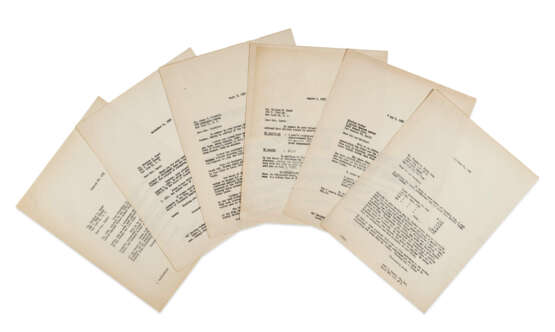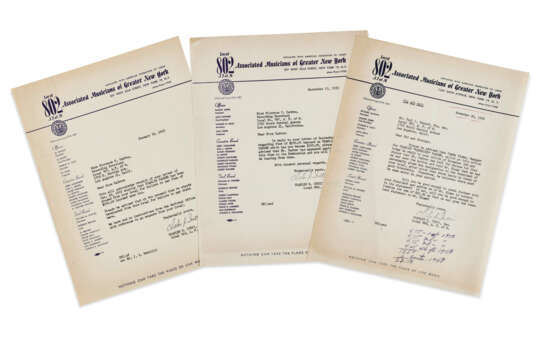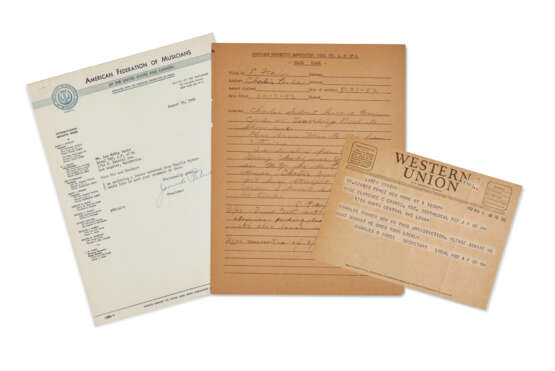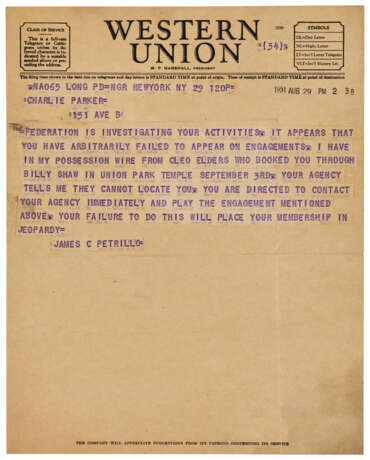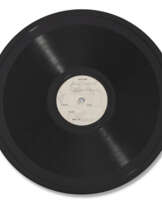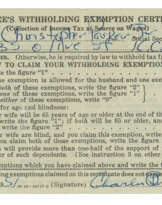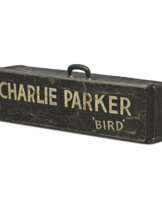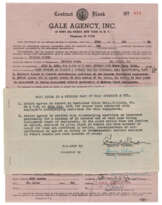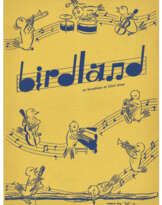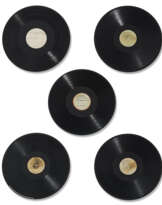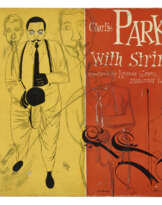A revealing archive of correspondence with a supplicatory typed letter, signed, spotlighting a protracted dispute with the American Federation of Musicians
28.09.2023 13:00UTC +00:00
Classic
Verkauft
3528GBP £ 3 528
| Auctioneer | CHRISTIE'S |
|---|---|
| Veranstaltungsort | Vereinigtes Königreich, London |
| Aufgeld | see on Website% |
Archiv
Die Auktion ist abgeschlossen. Es können keine Gebote mehr abgegeben werden.

ID 1016467
Los 181 | A revealing archive of correspondence with a supplicatory typed letter, signed, spotlighting a protracted dispute with the American Federation of Musicians
Schätzwert
£ 3 000 – 5 000
Charles “Charlie,” Jr. Parker
PARKER, Charles “Charlie,” Jr. (1920-1955).
A revealing archive of correspondence with a supplicatory typed letter, signed, spotlighting a protracted dispute with the American Federation of Musicians.
Although at the peak of his success, there was a marked decline in Parker's mental state through the early 1950s as his life and addictions spiralled out of control. During this period, Parker found himself in an endless feud with the authorities that directly controlled access to the clubs and bars that sustained his livelihood and sustained his creativity, and in particular with musician's union The American Federation of Musicians, as represented by the relentless LA Local 767, the incessantly intrusive Local 802, and even the president of the AFM himself James Petrillo, best known for having called the Recording Strike of 1942-4 which caused the virtual death of the Big Band. This illuminating archive of correspondence between Parker, Petrillo, Local 767 and Local 802, spanning over two years and regarding a single protracted dispute, reveals the considerable grief the union caused Parker and vice versa. Much mythologised as a legend and musical genius, these bureaucratic proceedings perhaps offer a glimpse of Parker's less appealing qualities - the side which Robert P. Vande Kappelle distinguishes as ‘Charlie Parker the sociopath, who managed in a short period of time to destroy his career, every relationship important to him, and finally himself.’
The dispute evidently originates in Los Angeles sometime in early 1950, when Parker apparently ceased making quarterly payments to LA Local 767 but did not officially resign from said Local by paying the obligatory resignation fee. The group opens at the point where Parker has received a notice of outstanding funds due to Local 767 and has already sent his Manager to Local 802 in New York to clear up the matter. The first letter, dated November 1950, from Charles R. Iucci of Local 802, New York, to Paul L. Howard of Local 767, requests confirmation and itemisation of the unpaid dues, which total $21.50, and relates Parker’s view of the sequence of events, ‘that he had personally given his resignation to the President of your Local, after which they shook hands in token of good friendship,’ to which Howard replies that Parker ‘has not been in this jurisdiction for a year or more’ and solicits Local 802’s assistance ‘in collecting the money from Mr. Parker’. Filed two years later in June 1952, when Parker eventually entered their jurisdiction to play at the Tiffany Club, the next instalment is a claim form for Local 767 completed in pencil by business manager Elmer Fain, recording that over three visits, Charlie could not produce a union card or travelling book – a permit for a musician to play in a jurisdiction other than their home local, reiterating ‘since Charlie came here to get him [sic] straight until [sic] now I haven’t seen a card or book’. At the foot of the page, a different hand in ink has noted the decision made two weeks later to fine Parker $350, and a facsimile letter dated 3 July 1952 informs Parker as such. In response, Parker writes to James Petrillo, the president of the AFM, on 14 August 1952, to request a stay of judgement so that he may file an appeal, with the plea ‘I am a family man and have been out of work for a long time and find it impossible to pay this amount,’ signing off ‘Fraternally yours, Charlie Parker’. Parker’s subsequent appeal letter was sold through these rooms in 2017, in which he rather eloquently explains that he did not have his Local 802 union card on his person during the Tiffany Club engagement because he was wearing a new suit (‘but after all we are only human and it is not a great deal to require that a union take a human attitude toward its members’). Petrillo forwards Parker’s plea to Leo McCoy Davis of Local 767 for his comments, which are decidedly unsympathetic: ‘He is a very popular musician, and if he is out of work, it is no doubt due to his conduct, which is very poor.’ While it is clear that Parker was still gigging regularly at this time, his “cabaret card” had been revoked by the NYPD on suspicion of narcotics possession, preventing him from making a living in New York City jazz clubs for over a year, and forcing him out on the road. Despite Parker remitting the original $21 resignation fee to Local 767 that September, the AFM – led by Petrillo - upheld the $350 fine, and the final letter from Iucci to Local 767, shows that from January 1953 he had also been terminated from Local 802 for failure to pay dues in New York. Kappelle, 280.
Five original one-page letters, including one signed by James C. Petrillo, as president of the American Federation of Musicians, three with the autograph ink-stamp of Charles R. Iucci, secretary of Local 802, the New York branch of the AFM, and Parker’s piteous plea, signed in black ink; together with an original telegram sent by Iucci; a claim form completed by Elmer Fain, business representative of Local 767 in LA; and seven pages of facsimile correspondence.
[With:] a Western Union telegram from James Petrillo, president of the AFM, to Charlie Parker, New York, 29 August 1951, admonishing Parker for his failure to appear for gigs and demanding that he show up for a forthcoming engagement: ‘You are directed to contact your agency immediately and play the engagement mentioned above. Your failure to do this will place your membership in jeopardy.’ As well as endorsing the action of Local 767 in penalising Bird, Petrillo was also responsible for the pursuit of Parker for non-fulfilment of various contractual obligations during 1951, when the revocation of his cabaret card had forced him out on the road: ‘Unable to work in New York City, Charlie spent the late summer and fall of 1951 touring the Midwest with his quintet and string group… Charlie was unreliable on and off the bandstand. He frequently missed jobs or turned up late and high. Club owners who complained about Charlie’s behaviour to the Shaw Agency received little satisfaction… Seeking to get out of the contract, he ignored calls and telegrams from the agency, leaving Shaw little recourse but to refer club owner complaints to the American federation of Musicians.’ Haddix, 136. One page, 254 x 203 mm. Provenance: The Norman R. Saks Collection (Vail, pl.117).
| Adresse der Versteigerung |
CHRISTIE'S 8 King Street, St. James's SW1Y 6QT London Vereinigtes Königreich | |
|---|---|---|
| Vorschau |
| |
| Telefon | +44 (0)20 7839 9060 | |
| Aufgeld | see on Website | |
| Nutzungsbedingungen | Nutzungsbedingungen |
